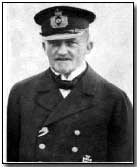Who's Who - Adolf von Trotha
 Adolf von Trotha (1868-1940)
assisted Reinhardt Scheer
in creating the Naval Supreme Command in August 1918 and was stridently in
favour of both unrestricted submarine warfare and a major fleet action
against Britain's Royal Navy.
Adolf von Trotha (1868-1940)
assisted Reinhardt Scheer
in creating the Naval Supreme Command in August 1918 and was stridently in
favour of both unrestricted submarine warfare and a major fleet action
against Britain's Royal Navy.
Trotha joined the navy in 1886 and in the years prior to World War One served in the torpedo branch and was attached to the East Asia Cruiser Squadron. Something of a protégé of Naval Minister Alfred von Tirpitz, Trotha served with his mentor at the Naval Office from 1901-06.
From 1910 until 1913 Trotha served in the Navy Cabinet before, in the latter year, being given command of the dreadnought Kaiser. With war on the horizon Trotha was a vocal advocate of bringing about a fleet action between German and British naval forces - a view that found little sympathy with the more cautious Kaiser, Wilhelm II, who acted to prevent just such a meeting.
As the war progressed Trotha also proved a key supporter of Tirpitz in arguing for a policy of unrestricted submarine warfare. Introduced in January 1917 implementation of the policy ultimately proved disastrous: while failing in its aim of knocking Britain out of the war in short order by starvation, it succeeded in bringing the U.S. into the war on the side of the Entente Powers within three months.
In January 1916 Trotha, as Vice-Admiral, was promoted as Reinhardt Scheer's Chief of Staff. Over the course of the following two years the pair worked closely in unifying the naval command structure, culminating in Scheer's appointment as head of the Naval Supreme Command in August 1918.
Meanwhile Trotha worked intensively to unite support within the navy for Hindenburg and Ludendorff's Third Supreme Command, the effective dictatorship that effectively ruled Germany from August 1916, and which enjoyed Trotha's unquestioning support.
Nevertheless Scheer and Trotha's success in unifying the naval command came too late in the war to make any difference to its outcome a few months later. Trotha in particular badly misjudged the morale of the High Seas Fleet in ordering a final suicidal confrontation with the British Grand Fleet in October 1918: the navy at Kiel mutinied, refusing to carry out their orders, hastening the collapse of the German empire.
Subsequent revolution and the Weimar Republic brought Trotha an appointment as Chief of the Admiralty (within a reduced navy) until his resignation in October 1920 amid accusations of involvement in the Kapp Putsch. He subsequently served in minor naval political roles under the Nazi regime.
He died in 1940.
An "incendiary shell" is an artillery shell packed with highly flammable material, such as magnesium and phosphorous, intended to start and spread fire when detonated.
- Did you know?
